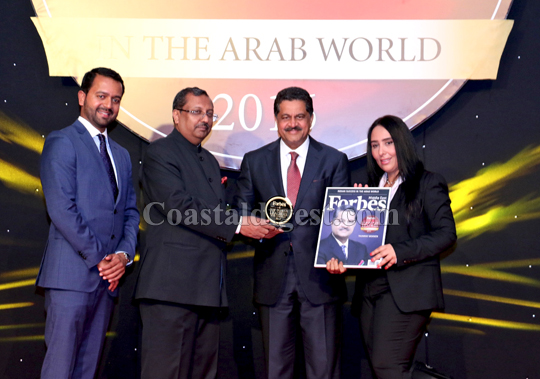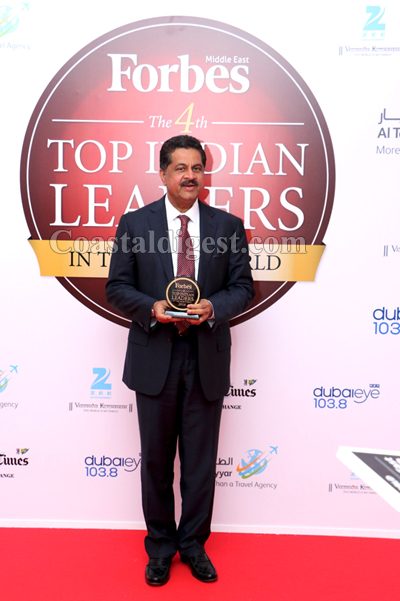Dubai, May 4: Thumbay Moideen, the Founder President of Thumbay Group has been included in the Forbes' list of Top Indian Leaders in the Arab World' for the second consecutive year.

The prestigious award was presented to Mr. Moideen at a glittering event held at Waldorf Astoria, Dubai Palm Jumeirah at 7:00 pm on Tuesday, 3rd May 2016, to celebrate the most successful and groundbreaking Indian leaders in the Middle East.
His Excellency Mr. T.P. Seetharam, Ambassador of India to the UAE delivered the keynote speech at the event. This year's event was the fourth edition of the awards which recognize the most powerful and prosperous of Indian heads in the Arab world who have set up some of the most successful companies in the Middle East, using their vision, ingenuity and formidable leadership to bring capital to their shareholders and investment into the economies of the region.

After receiving the award, Mr. Moideen said that he was honored to figure in the list of top Indian leaders in the Arab world for the second consecutive year. “We take pride in these honors and recognitions, which motivate us further and add more responsibility to what we do.
While thanking Forbes for this prestigious recognition, I also thank my dedicated team for their hard work and commitment. I would also like to acknowledge the support of the Rulers of this great country, for their constant encouragement for our endeavors,” he added.
Founded by Mr. Thumbay Moideen in 1998, Thumbay Group is an international business conglomerate headquartered in DIFC - Dubai. The Group has successfully diversified into 14 different sectors in a span of just 17 years.
The Group today employs more than 3500 people, which will rise to 6000 with the completion of ongoing projects in the next two years, and to 15,000 employees by the end of 2020.
The Gulf Medical University, the leading private medical university in the region owned and operated by Thumbay Group has a student cohort of over 73 nationalities and faculty and staff from over 22 countries.
The Thumbay chain of hospitals, the constituent teaching hospitals of the Gulf Medical University, is one of the largest healthcare services provider in the UAE, serving over 2500 patients daily, from more than 175 countries. Apart from being an acknowledged leader in the health sector, Thumbay Group operates a reputed pharmacy chain, diagnostic centres, multi-brand retail outlets, world-class wellness centres, a prestigious chain of coffee shops, restaurants, popular health & lifestyle publication, etc.






 Welcoming the move Dr Arathi Krishna told coastaldigst.com that Indians stranded in any foreign country can utilize this facility. "Initially, I was approached by Mr Zakaria and Mr Sheik who wanted chartered flights to help their employees fly back to India. I asked them to write to the Indian Ambassador in Saudi Araia Mr Ausaf Sayeed. Then I requested the ambassador to forward the request to Joint Secretary Dr Nagendra Prasad, who is in charge of gulf division in the Ministry of External Affairs, and then to Secretary on charge of Gulf and then I requested Secretary of Economic Relations Mr T S Tirumurti who was also in charge of Gulf to follow this up," she said.
Welcoming the move Dr Arathi Krishna told coastaldigst.com that Indians stranded in any foreign country can utilize this facility. "Initially, I was approached by Mr Zakaria and Mr Sheik who wanted chartered flights to help their employees fly back to India. I asked them to write to the Indian Ambassador in Saudi Araia Mr Ausaf Sayeed. Then I requested the ambassador to forward the request to Joint Secretary Dr Nagendra Prasad, who is in charge of gulf division in the Ministry of External Affairs, and then to Secretary on charge of Gulf and then I requested Secretary of Economic Relations Mr T S Tirumurti who was also in charge of Gulf to follow this up," she said.
Comments
Congratulations sir, we are proud of you.
Congratulations sir, we are proud of you.
Congratulations sir, we are proud of you.
CONGRATULATIONS SIR.
Entire Thumbe village is proud of you sir.
Add new comment